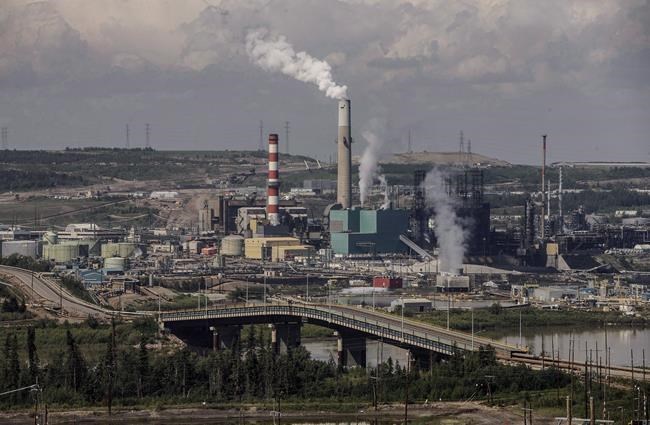CALGARY — Splashed across billboards and city buses, onnewspaper spreads and Facebook feeds, the "Let's Clear the Air" ad campaign by the Pathways Alliance group of oilsands companies is a multi-million-dollar public relations blitz by an industry keen to show it's committed to helping fight climate change.
It's also the target of the latest strategy by Canada's environmental movement, which has expanded its war against the fossil fuel industry to a new battleground: the federal Competition Bureau.
In the last year, Canadian green groups have lodged at least four formal complaints with the bureau, the independent law enforcement agency tasked with protecting consumers by fostering a competitive marketplace.
The complaints allege false or misleading environmental claims by fossil fuel companies or — in the case of a complaint against RBC — those who finance them.
Under Canada's Competition Act, it only takes six signatories to a deceptive advertising complaint to compel the bureau to launch an investigation.
While no conclusion of wrongdoing has been reached in any of the ongoing cases, the environmentalists hope their new strategy will raise awareness of what they call "greenwashing" — a perceived tendency by companies to market their products and practices as more sustainable than they really are.
"We're at a point, I think, with climate change where there are very few actual deniers left out there," said Keith Brooks, program director of Environmental Defence, which is a co-signer to Greenpeace Canada's complaint against the Pathways Alliance as well as the lead complainant alleging deceptive marketing in a campaign by Enbridge Gas.
"Most companies now are agreeing that this is an issue and that we need to go as far as net-zero (emissions) ... but, you know, the problem is that if it's just words, and not backed up by real action, then it actually is a tactic to delay action."
In the case of the Pathways Alliance ad campaign, the oilsands industry is promoting its plan to achieve net-zero greenhouse gas emissions from production by 2050 — a plan that includes spending $16.5 billion to build what would be one of the largest carbon capture and storage projects in the world.
But environmentalists argue the ads are misleading because they don't make it clear that oilsands firms are actually planning to increase oil output overall — their net-zero goals only apply to the actual extraction process, not the product they produce.
In the complaint against Enbridge, as well as one against the Canadian Gas Association, activists take issue with the industry's depiction of natural gas as a "clean" energy solution, arguing that natural gas is a fossil fuel that contributes to global warming.
And when it comes to RBC, complainants say the bank's record of financing fossil fuel projects doesn't line up with its own public statements on the environment.
The Pathways Alliance said it was taken aback by the complaint against its ad campaign, which it says was only intended to let Canadians know the oilsands industry has heard their concerns about climate change and wants to be part of the solution.
"To get a complaint to the Competition Bureau, I think it did surprise us initially because we sort of feel we’re listening and responding to what’s being asked of industry," said Kendall Dilling, Pathways Alliance president.
There is some precedent for the Competition Bureau to intervene in cases related to a company's environmental claims.
In January 2022, Keurig Canada agreed to pay a $3 million penalty after a Competition Bureau investigation concluded the company's single-use "K-cup" coffee pods were not as recyclable as Keurig had made them out to be.
A few years before that, the bureau reached an agreement with Volkswagen that ultimately saw a total of $17.5 million in penalties paid by the automaker in the wake of a 2016 emissions-reporting scandal.
But Leah Temper with the Canadian Association of Physicians for the Environment — a group that has backed three Competition Bureau complaints — said Canada lags behind many other countries on this issue.
The EU, for example, recently passed a law that aims to crack down on greenwashing by banning the use of terms such as "carbon neutral" in product claims.
"If we look at what other jurisdictions are doing, they're being much more proactive in this area," Temper said, adding the federal government's ongoing review of competition policy in this country means now is the perfect time to raise these concerns.
"The Canadian Competition Bureau doesn't have a green task force, which is something a lot of our trading partners have."
The Competition Bureau says cracking down on deceptive marketing, including false, misleading and unsubstantiated environmental claims by companies of all types, is a priority for the agency.
It notes that as more Canadians demand products and services with a reduced environmental impact, there has been a noticeable increase in false, misleading or unsupported environmental claims by businesses.
But Joanne McNeish, an associate professor of marketing at Toronto Metropolitan University, said the fossil fuel industry in particular likely feels pressure to communicate not just to consumers, but to investors and governments, what it's doing on climate change.
"I think they feel that if they don't talk back, they leave a gap where only the activists are talking," she said.
And those activists, she added, are increasingly using modern, corporate tools — such as competition law — to fight their battles.
"Environmental activism used to mean, you know, getting in a ship and blocking a tanker. Now it's transitioning into more of a paperwork-bureaucracy-regulations kind of activity," she said.
"It's this sophistication of activism."
This report by The Canadian Press was first published Oct. 1, 2023.
Amanda Stephenson, The Canadian Press



